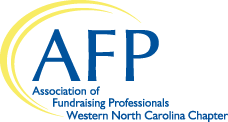Happy May, AFP friends!
I am excited to jump in on this month’s newsletter as the new IDEA (Inclusion Diversity Equity and Access) Chair for the AFP WNC Board. Earlier in April, I had the opportunity to attend AFP ICON 2024 in Toronto – this year’s global fundraising conference really focused in on rich conversations around how IDEA values show up in philanthropy and fundraising. The experience got me thinking about one of my favorite quotes by Lilla Watson* that I have posted on the whiteboard in front of my desk in West Asheville.
“If you have come to help me, you are wasting your time. But if you have come because your liberation is bound up with mine, then let us work together.”
So much of fundraising work is identified as “help” – we are raising money to help animals, to help children, to help the unhoused, to help families in poverty. What we understand from great thought leaders like Watson and Nikole Hannah Jones, who shared her incredible experience and wisdom as the keynote at AFP ICON, is that it is not “help” at all that we offer.
Fundraisers often serve as a conduit for wealth redistribution that feels comfortable, valuable, trusted and rewarding for a donor. Our roles root so much deeper into traditionally unequitable systems of wealth, access, and opportunity than many other positions in nonprofits. To put it in perspective, say you take a high net worth donor to lunch, and they contribute $10,000 to your organization – in one day, you have secured a donation (disposable resources) that is the equivalent of nearly 50% of the average median household income (non-disposable resources) for a Black family in Asheville, according to the 2024 Cease Harm Audit. Fundraisers hold that tension.
In the April issue of Advancing Philanthropy, Hannah Jones asks, “Is philanthropy working from the bottom up, supporting the grassroots effort of people determining what’s best for themselves, or is it a bunch of people on high who have wealth and resources deciding what they think is best for communities?”
What AFP ICON 2024 showed me is that we have the power to work from the bottom up. We are uniquely positioned to radically shift the philanthropic narrative – to invert the natural hierarchy of philanthropy and think about reinvesting resources that were collected through generations of injustice and harm into the communities that experienced that injustice and harm. Ready to take the leap?

Jess McLean
AFP WNC IDEA Chair
*1985, Lilla Watson, a visual artist, activist and academic from Australia, spoke at the United Nations Decade for Women Conference in Nairobi. She is credited with the following quote (though she centers the collective process of Aboriginal activists in 1970’s Queensland as the primary source).

